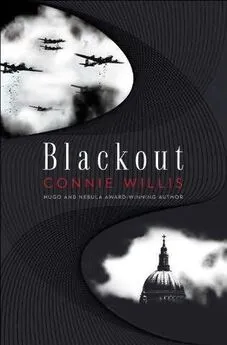Connie Willis - Blackout
- Название:Blackout
- Автор:
- Жанр:
- Издательство:неизвестно
- Год:неизвестен
- ISBN:нет данных
- Рейтинг:
- Избранное:Добавить в избранное
-
Отзывы:
-
Ваша оценка:
Connie Willis - Blackout краткое содержание
In her first novel since 2002, Nebula and Hugo award-winning author Connie Willis returns with a stunning, enormously entertaining novel of time travel, war, and the deeds—great and small—of ordinary people who shape history. In the hands of this acclaimed storyteller, the past and future collide—and the result is at once intriguing, elusive, and frightening.
Oxford in 2060 is a chaotic place. Scores of time-traveling historians are being sent into the past, to destinations including the American Civil War and the attack on the World Trade Center. Michael Davies is prepping to go to Pearl Harbor. Merope Ward is coping with a bunch of bratty 1940 evacuees and trying to talk her thesis adviser, Mr. Dunworthy, into letting her go to VE Day. Polly Churchill’s next assignment will be as a shopgirl in the middle of London’s Blitz. And seventeen-year-old Colin Templer, who has a major crush on Polly, is determined to go to the Crusades so that he can “catch up” to her in age.
But now the time-travel lab is suddenly canceling assignments for no apparent reason and switching around everyone’s schedules. And when Michael, Merope, and Polly finally get to World War II, things just get worse. For there they face air raids, blackouts, unexploded bombs, dive-bombing Stukas, rationing, shrapnel, V-1s, and two of the most incorrigible children in all of history—to say nothing of a growing feeling that not only their assignments but the war and history itself are spiraling out of control.
Blackout - читать онлайн бесплатно полную версию (весь текст целиком)
Интервал:
Закладка:
A bomb exploded nearby with a sudden cellar-shaking crash, and Nelson leaped up, barking wildly. Polly jumped, and the newsprint tore across.
“What was that?” Miss Laburnum demanded sleepily.
“Stray five-hundred-pounder,” Mr. Simms said, stroking his dog’s head.
Mr. Dorming listened and then nodded. “They’re on their way home,” he said and lay back down, but after a few minutes of silence, the raids abruptly started up again, the anti-aircraft guns beginning to pound, the planes roaring overhead.
Mr. Dorming sat up again, and then the rector and Lila, who said disgustedly, “Oh, not again!” The others, one by one, were waking up and staring nervously at the ceiling. Polly kept wrapping, determined to nail the skill down before morning. There was a clatter, like hail hitting the street above them.
“Incendiaries,” Mr. Simms said.
A crump, and then a long, screaming whoosh, and a pair of explosions. It wasn’t as deafening as it had been the night before, but the rector walked over to Sir Godfrey, who was reading a letter, and said quietly, “The raids seem to be bad again tonight. Would you mind terribly, Sir Godfrey, gracing us with another performance?”
“I should be honored,” Sir Godfrey said, folding up his letter, putting it in his coat pocket, and standing up. “What will you have? Much Ado? Or one of the tragedies?”
“Sleeping Beauty,” Trot, on her mother’s lap, said.
“Sleeping Beauty?” he roared. “Out of the question. I am Sir Godfrey Kingsman. I do not do pantomime,” which should have reduced Trot to tears, but didn’t.
“Do the one about the thunder again,” she said.
“The Tempest,” he said. “A far better choice,” and Trot beamed.
He truly is wonderful, Polly thought, wishing she had time to watch him instead of having to practice wrapping.
“Oh, no, do Macbeth, Sir Godfrey,” Miss Laburnum said. “I’ve always longed to see you in-”
Sir Godfrey had drawn himself up to his full height. “Do you not know calling the Scottish play by its name brings bad luck?” he boomed at her, then looked up at the ceiling and listened for a moment to the crashing and thud of bombs as if he expected one to come down on them in retribution. “No, dear lady,” he said more calmly. “We have had enough this fortnight of overreaching ambition and violence. There are fog and filthy air enough abroad tonight.”
He bowed sweepingly to Trot. “‘The thunder one’ it shall be, ‘full of sounds and sweet airs that give delight and hurt not.’ But if I am to be Prospero, I must have a Miranda.” He strode over to Polly and extended his hand to her. “As forfeit for having mutilated my Times,” he said, looking down at the torn newspaper, “Miss…?”
“Sebastian,” she said, “and I’m sorry I-”
“No matter,” he said absently. He was looking at her thoughtfully. “Not Sebastian, but his twin Viola.”
“I thought you said her name was Miranda,” Trot said.
“It is,” he said, and under his breath, “We shall do Twelfth Night another time.”
He pulled her to standing. “‘Come, daughter, attend, and I shall relate how we came unto this island beset by strange winds.’” He produced his book from his breast pocket and handed it to her. “Page eight,” he whispered. “Scene two. ‘If by your art, dearest father-’”
She knew the speech, but a shopgirl in 1940 wouldn’t, so she took the book and pretended to read her line. “‘If by your art, dearest father, you have put the wild waters in this roar,’” she read, “‘allay them. The sky, it seems, would pour down stinking pitch-’”
“‘Can’st thou remember a time before we came unto this cell?’” he asked.
“‘’Tis far off,’” she said, thinking of Oxford, “‘and rather like a dream than an assurance that my remembrance warrants-’”
“‘What seest thou else,’” he said, looking into her eyes, “‘in the dark backward and abysm of time?’”
Why, he knows I’m from the future, she thought, and then, He’s only speaking his lines, he can’t possibly know, and completely missed her cue. “‘What foul play… ’” he prompted.
She had no idea what part of the page they were on. “‘What foul play had we that we came from thence?’” she said. “‘Or blessed was’t we did?’”
“‘Both, both, my girl! By foul play, as thou sayst, were we heav’d thence, but blessedly holp hither,’” he said, taking hold of her hands, which still held the book, and launched into Prospero’s explanation of how they’d come to the island and then, without even a pause, into his charge to Ariel.
She forgot the book, forgot the role of 1940s shopgirl she was supposed to be playing, forgot the people watching them and the planes droning overhead-forgot everything except for his hands holding hers captive. And his voice. She stood there facing him enrapt-“spell-stopp’d,” as if he truly were a sorcerer-and wished he would go on forever.
When he came to “‘I’ll break my staff,’” he let go of her hands, raised his own above his head, and brought them down sharply, pantomiming the snapping of an imaginary staff, and the audience, who faced attack and annihilation nightly with equanimity, flinched at the action. The three little girls shrank against their mother, mouths open, eyes wide.
“‘I’ll drown my book,’” he said, his voice rich with power and love and regret, “‘These our actors, as I foretold you, were all spirits and are melted into thin air.’”
Oh, don’t, Polly thought, though what came next was Prospero’s most beautiful speech. But it was about palaces and towers and “the great globe itself” being destroyed, and he must have sensed her silent plea because he said instead, “‘We, like this insubstantial pageant faded, leave not a rack behind,’” and Polly felt her eyes fill with tears.
“‘You do look as if you were dismayed,’” Sir Godfrey said gently, taking her hands again. “‘Be cheerful, child. Our revels now are ended,’” and the all clear sounded.
Everyone immediately looked up at the ceiling, and Mrs. Rickett stood up and began putting on her coat. “The curtain has rung down,” Sir Godfrey muttered to Polly with a grimace and moved to release her hands.
She shook her head. “‘It was the nightingale. It is not yet near day.’”
He gave her a look of awe, and then smiled and shook his head. “‘It was the lark,’” he said regretfully. “Or worse, the chimes at midnight,” and let go of her hands.
“Oh, my, Sir Godfrey, you were so affecting,” Miss Laburnum said, crowding up to him with Miss Hibbard and Mrs. Wyvern.
“We are but poor players,” he said, gesturing to include Polly, but they ignored her.
“You were really good, Sir Godfrey,” Lila said.
“Even better than Leslie Howard,” Viv put in.
“Simply mesmerizing,” Mrs. Wyvern said.
Mesmerizing is right, Polly thought, putting on her coat and gathering up her bag and the newspaper-covered hymnal. He made me forget all about practicing my wrapping. She glanced at her watch, hoping the all clear had gone early, but it was half past six. It is the lark, she thought, feeling like Cinderella, and I’ve got to go home and wash out my blouse.
“I do hope you’ll grace us with another performance tomorrow night, Sir Godfrey,” Miss Laburnum was saying.
“Miss Sebastian!” Sir Godfrey extricated himself from his admiring crowd and hurried over to her. “I wished to thank you for knowing your lines-something my leading ladies scarcely ever do. Tell me, have you ever considered a career in the theater?”
“Oh, no, sir. I’m only a shopgirl.”
“Hardly,” he said. “‘Thou art the goddess on whom these airs attend, a paragon, a wonder.’”
“‘No wonder, sir, but certainly a maid,’” she quoted, and he shook his head ruefully.
“A maid, indeed, and were I forty years younger, I would be your leading man,” he said, leaning toward her, “and you would not be safe.”
I don’t doubt that for a moment, she thought. He must have been truly dangerous when he was thirty, and thought suddenly of Colin, saying, “I can shoot for any age you like. I mean, not seventy, but I’m willing to do thirty.”
“Oh, Sir Godfrey,” Miss Laburnum said, coming up. “Next time could you do something from one of Sir James Barrie’s plays?”
“Barrie?” he said in a tone of loathing. “Peter Pan?”
Polly suppressed a smile. She opened the door and started up the steps.
“Viola, wait!” Sir Godfrey called. He caught up to her halfway up the steps. She thought he was going to take her hands again, but he didn’t. He simply looked at her for a long, breath-catching moment.
Thirty, nothing, she thought. He’s dangerous now.
“Sir Godfrey!” Miss Laburnum called from inside the door.
He glanced behind him, and then back at Polly. “‘We are too late met,’” he said. “‘The time is out of joint,’” and went back down the stairs.
Real planes, real bombs. This is no fucking drill.
– VOICE ON THE PA OF THE OKLAHOMA, PEARL HARBOR, 7 DECEMBER 1941Dunkirk-29 May 1940
MIKE STARED DAZEDLY AT THE SCENE BEFORE HIM. THE town of Dunkirk lay burning no more than a mile to the east of them, orange-red flames and clouds of acrid black smoke from the oil tanks billowing out over the docks. There were fires on the docks and on the beaches, and in the water. A cruiser lay off to the right, its stern angled out of the water. A tugboat stood alongside, taking soldiers off. South of it stood a destroyer and beyond it a Channel packet. It was on fire, too.
Flashes of light-from artillery guns?-played along the horizon, and the destroyers’ guns answered with a deafening roar. There was an explosion on shore, and a billowing puff of flame-a gas tank exploding-and the far-off rattle of machine-gun fire. “I can’t believe it!” Jonathan shouted over the din, his voice bubbling over with excitement. “We’re actually here!”
Mike stared at the fire-lit harbor paralyzed, afraid to let go of the railing, afraid to even move. Anything he did-or said-could have a catastrophic effect on events. “This is great!” Jonathan said. “Do you think we’ll get to see any Germans?”
“I hope not,” Mike said, glancing up at the sky and then at the horizon, peering through the drifting smoke, trying to see if dawn was approaching. The harbor at Dunkirk had been an obstacle course of half-submerged wrecks, and they didn’t have a hope of getting through it if they couldn’t see. But they were more likely to be attacked by Stukas in daylight. And, oh, Christ, on the twenty-ninth the weather had cleared, and an offshore breeze had blown the smoke inland, away from the harbor, leaving the boats trying to load the soldiers sitting ducks. There was no breeze yet. But for how long?
“Kansas, don’t just stand there!” the Commander shouted. “You’re supposed to be keeping the Lady Jane from ramming into something!”
Am I? Mike thought. Or are you supposed to hit a trawler or a fishing smack and go down with all hands? It was impossible to know what to do, or what not to do-like walking through a minefield blindfolded, knowing that every step could make the whole thing blow up in your face. Only this was worse, because so could standing still. Was shouting a warning what would alter the course of history, or keeping silent?
“Ship to starboard!” Jonathan shouted from the other side of the bow and the Commander turned the wheel, and they chugged past an oncoming minesweeper and into the harbor.
Читать дальшеИнтервал:
Закладка:

![Jane_BlackCat - Понять не поздно... [СИ]](/books/1148838/jane-blackcat-ponyat-ne-pozdno-si.webp)
![Jane_BlackCat - За краем Вечности [СИ]](/books/1148839/jane-blackcat-za-kraem-vechnosti-si.webp)

